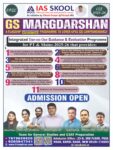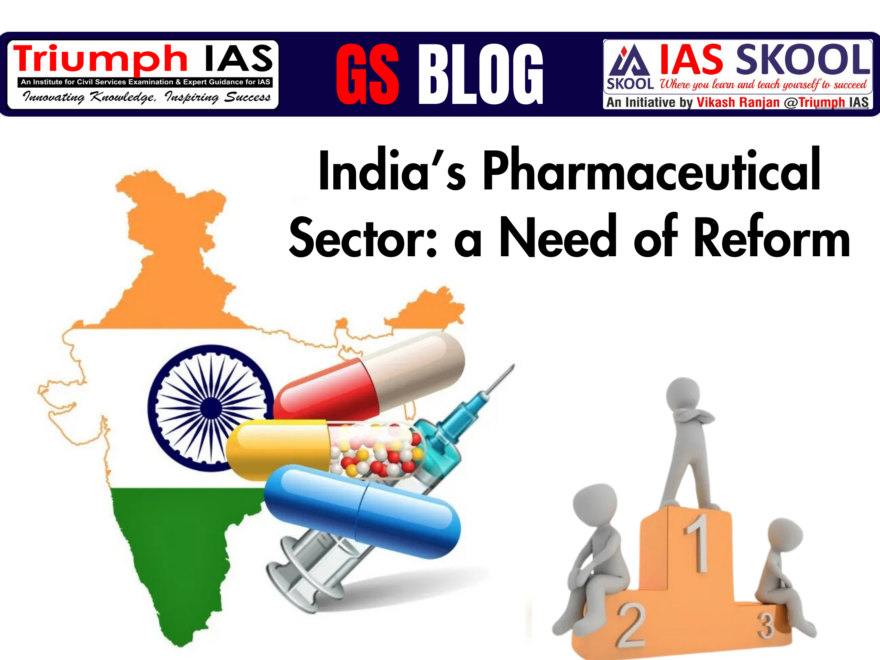India’s Pharmaceutical Sector: a Need of Reform
Generic medicines play a crucial role in improving healthcare accessibility in India, saving consumers approximately ₹30,000 crores through government initiatives by 2024. Although bioequivalent to branded drugs, concerns over their quality persist. The existing regulatory framework, divided between the Central Drugs Standard Control Organisation (CDSCO) and State Drug Regulatory Authorities, enables some manufacturers to exploit regulatory gaps, compromising drug quality. Despite multiple committee recommendations since 1954, India has yet to implement centralized pharmaceutical regulation. This underscores the urgent need for comprehensive reforms to ensure both affordability and quality in the country’s pharmaceutical sector.
Current Status of Pharmaceutical Regulation in India
Regulatory Bodies
- Central Drugs Standard Control Organization (CDSCO):
Established in 1940, CDSCO serves as the primary regulatory authority overseeing the pharmaceutical sector. It ensures that drugs, cosmetics, and medical devices meet safety, efficacy, and quality standards.
- Department of Chemicals and Petrochemicals (DCP):
Founded in 1991, the DCP is responsible for policy and planning related to chemicals, petrochemicals, and pharmaceuticals. It supports the sector’s growth and development.
- National Pharmaceutical Pricing Authority (NPPA):
Created in 1994, the NPPA regulates the prices of essential medicines, ensuring affordability and accessibility. It also revises and updates the list of drugs under price control.
Key Policies and Regulations
- Drug Price Control:
The Drugs Price Control Order (DPCO), first introduced in 1970, empowers the government to regulate the prices of 74 bulk drugs and their formulations. While it ensures affordability, direct pricing control can discourage pharmaceutical companies from producing certain drugs.
- Product Quality and Manufacturing Standards:
The CDSCO enforces Good Manufacturing Practices (GMP) to ensure that pharmaceutical plants and materials meet stringent quality standards. The National Pharmaceutical Policy further aims to strengthen GMP compliance across the sector.
- Patent and Intellectual Property Regulations:
The Patent Act, 1970 (amended in 2005) outlines provisions for drug patentability, royalty, generic drug production immunity, patent opposition, compulsory licensing, and export.
TRIPS (Trade-Related Aspects of Intellectual Property Rights) provides protection for undisclosed clinical trial data.
Key Regulatory Guidelines
- Drugs and Cosmetics Act, 1940:
Governs the import, manufacture, distribution, and sale of drugs, cosmetics, and medical devices in India.
- Schedule M:
Details the general and specific requirements for factory premises, materials, and equipment used in drug manufacturing.
- Schedule T:
Prescribes GMP specifications for the production of Ayurvedic, Siddha, and Unani medicines.
- Schedule Y:
Outlines the legislative requirements for conducting clinical trials in India.
- Good Clinical Practice (GCP) Guidelines:
Developed by the Ministry of Health, the DCGI, and ICMR, these guidelines are aligned with international standards like the Declaration of Helsinki and the International Council for Harmonisation of Technical Requirements for Pharmaceuticals for Human Use (ICH). They regulate clinical research involving human subjects.
- The Pharmacy Act, 1948:
Regulates the education and practice of pharmacy in India.
- The Drugs and Magic Remedies (Objectionable Advertisement) Act, 1954:
Prohibits advertisements that promote drugs with exaggerated or magical claims.
- The Narcotic Drugs and Psychotropic Substances (NDPS) Act, 1985:
Regulates the manufacture, distribution, and use of narcotic drugs and psychotropic substances.

Major Challenges Arising from Inadequate Pharmaceutical Regulation
Challenges in India’s Pharmaceutical Sector
- Proliferation of Substandard and Counterfeit Drugs:
Weak enforcement mechanisms allow low-quality and counterfeit drugs to infiltrate the market, compromising public health and eroding patient trust.
- This issue is particularly severe in low-income countries with minimal regulatory oversight, leading to higher morbidity and mortality rates.
- In India, regulatory gaps and a fragmented market dominated by small manufacturers enable the production and distribution of substandard drugs.
- Example: The World Health Organization (WHO) estimates that 10% of drugs in low- and middle-income countries are substandard or falsified. Additionally, WHO linked Indian-made cough syrups to acute kidney failure and fatalities among children in Gambia.
- Erosion of International Trust in Exports:
Inconsistent adherence to global standards tarnishes the reputation of exporting countries, reducing their competitiveness in international markets.
- Regulatory lapses such as data fabrication and inadequate quality checks undermine confidence among global buyers.
- This impacts long-term economic prospects for pharmaceutical-exporting nations like India.
- Example: Since early 2022, Indian drug manufacturers have received over nine FDA warning letters, risking bans on new product exports to the U.S. The Ranbaxy scandal remains a notable case of international regulatory failure.
- Antimicrobial Resistance (AMR) Crisis:
Unregulated antibiotic production and irrational use contribute significantly to the growing AMR crisis, a critical global health threat.
- AMR undermines healthcare systems by making common infections untreatable, prolonging illnesses, and increasing mortality rates.
- The lack of stringent oversight enables pharmaceutical companies to produce fixed-dose antibiotic combinations without proper clinical trials.
- Examples: Nearly 64% of antibiotics sold in India are unapproved, fueling resistance. Surveys indicate that many Indian inpatients are prescribed multiple antibiotics, exacerbating AMR.
- Adverse Drug Reactions (ADRs) and Lack of Pharmacovigilance:
Weak monitoring systems fail to track and address ADRs, exposing patients to long-term health risks.
- Regulatory authorities often lack resources and mechanisms for real-time drug safety evaluation, reflecting inadequate post-marketing surveillance.
- Example: Despite 895 ADR Monitoring Centres, India contributes only 2% to the global ADR database. The 2019 recall of ranitidine due to N-nitrosodimethylamine contamination exposed critical gaps in pharmacovigilance.
- Barriers to Global Market Entry:
Inconsistent regulatory frameworks and a lack of transparency hinder emerging pharmaceutical firms from accessing international markets.
- Smaller manufacturers face challenges in scaling operations and meeting stringent global compliance requirements.
- Example: Only 19% of the 10,500 pharmaceutical manufacturing units in India hold WHO-GMP certification, limiting market penetration into regulated regions like the U.S. and EU.
- Environmental Damage from Pharmaceutical Waste:
Improper disposal of pharmaceutical waste leads to significant environmental contamination, affecting ecosystems and public health.
- Effluent discharge from manufacturing units, particularly in emerging economies, pollutes rivers and groundwater.
- Examples: A recent study found pharmaceutical pollutants in 43.5% of global rivers, with the Yamuna River ranking among the most polluted. India is also a major contributor to global antibiotic pollution, aggravating the AMR crisis.
- Disparities in Access to Essential Medicines:
Inadequate price regulation and monopolistic practices make essential medicines unaffordable for marginalized populations.
- Weak enforcement of drug price controls allows companies to charge exorbitant rates, exacerbating health inequities.
- Accessibility issues are especially severe in rural and remote areas.
- Example: Only 12.2% of respondents in a recent survey reported access to subsidized medicines at Pradhan Mantri Jan Aushadhi Kendras within commutable distances from their villages.
- Ineffectiveness of Compliance Standards:
Fragmented and complex regulatory systems confuse manufacturers, reducing compliance rates and increasing product rejections in international markets.
- Different standards across agencies like FSSAI, BIS, and APEDA lead to redundancies and inefficiencies, limiting international acceptance of Indian pharmaceutical products
Measures to Enhance Drug Regulation in India
- Streamlining Regulatory Frameworks:
A unified and transparent regulatory structure is essential to eliminate overlaps and improve accountability.
- Merging agencies like the CDSCO and state-level bodies into a Centralized Drug Authority can enhance coordination and compliance.
- This will standardize approval, testing, and monitoring processes, reducing inefficiencies in the current system.
- Example: The U.S. Food and Drug Administration (FDA) serves as a model, ensuring consistency in drug regulation and enforcement across states.
- Strengthening Pharmacovigilance and Post-Marketing Surveillance:
Expanding pharmacovigilance systems can help monitor adverse drug reactions (ADRs) more effectively, enhancing public safety.
- The Pharmacovigilance Programme of India (PvPI) should include private hospitals, rural health centers, and e-pharmacies to boost ADR reporting.
- Advanced technologies like data analytics and AI can predict potential drug risks earlier.
- Enforcing Compliance with Good Manufacturing Practices (GMP):
Periodic audits and real-time monitoring of manufacturing facilities are necessary to ensure GMP compliance.
- Stricter penalties for violations and incentives for compliance can foster accountability.
- Introducing QR codes on drug packaging will enable traceability and verification across the supply chain.
- Creating a National Drug Database for Transparency:
A centralized, publicly accessible database listing approved drugs, manufacturers, and their regulatory statuses can improve transparency.
- Healthcare providers and consumers can verify drug authenticity and prevent the sale of counterfeit or unapproved products.
- Blockchain technology can be integrated to ensure data integrity.
- Improving Regulatory Capacity and Infrastructure:
Investing in advanced testing laboratories, skilled personnel, and digital tools will strengthen India’s regulatory capabilities.
- Funds from the National Health Mission can address infrastructure gaps, particularly in rural and semi-urban areas.
- Regulatory staff should undergo regular training in global standards and practices.
- Harmonizing Domestic and International Standards:
Aligning India’s drug regulations with global benchmarks like those of the US FDA and the European Medicines Agency (EMA) will improve market acceptance.
- Bilateral agreements for mutual recognition of standards can reduce export rejections and enhance global competitiveness.
- A Single Window Clearance System for export certifications can streamline the approval process.
- Encouraging Ethical Clinical Trials and R&D Oversight:
Stricter guidelines for clinical trials, coupled with real-time monitoring, can ensure ethical practices and safeguard patient safety.
- Establishing a national oversight committee with AI-enabled monitoring tools can enhance trial compliance.
- Offering tax incentives for ethical R&D can encourage innovation while maintaining high standards.
- Regulating Online Pharmacies and Digital Platforms:
Stringent oversight of digital platforms is crucial to curb the sale of counterfeit and unlicensed drugs.
- Mandatory registration of e-pharmacies, linked to Aadhaar-enabled verification systems, can improve accountability.
- AI tools can monitor online transactions to detect irregularities.
- Incentivizing Sustainable Pharmaceutical Practices:
Promoting green manufacturing practices can minimize environmental damage caused by pharmaceutical waste.
- Strict enforcement of effluent treatment norms and subsidies for cleaner technologies can drive compliance.
- Collaborations with agencies like CPCB and MoEFCC can ensure adherence to environmental guidelines.
- Building Public Awareness and Consumer Empowerment:
Educating the public about safe drug usage, identifying counterfeit medicines, and reporting adverse effects is essential.
- Public campaigns through schools, mass media, and community programs can raise awareness.
- Introducing a toll-free helpline and mobile app for drug-related grievances can empower consumers.
- A campaign like “Be Aware, Report Counterfeit” could enhance public participation.
- Developing Regional Drug Regulation Hubs:
Establishing regional hubs with advanced laboratories and regulatory offices can decentralize oversight and improve efficiency.
- These hubs can address specific needs like drug testing, inspections, and monitoring in underserved areas.
- Decentralization will reduce the burden on central agencies and ensure timely enforcement.
- Adopting Blockchain for Supply Chain Transparency:
Blockchain technology can ensure end-to-end visibility in the pharmaceutical supply chain, preventing counterfeit drugs from entering the market.
- It can also enhance product traceability, ensuring compliance at every stage.
- A government-backed blockchain system can boost stakeholder confidence in the pharmaceutical supply chain.
- Creating a Real-Time Drug Recall Mechanism:
A robust, technology-enabled drug recall system is crucial to swiftly remove substandard or harmful drugs from the market.
- A centralized alert system linking manufacturers, wholesalers, and retailers can facilitate immediate action.
- Regular mock drills can enhance readiness for large-scale recalls.
- Introducing Performance-Based Manufacturer Accreditation:
A performance-based accreditation system can encourage manufacturers to maintain high-quality standards.
- Rankings based on adherence to GMP, environmental standards, and innovation can foster healthy competition.
- Regular updates to accreditation criteria will ensure alignment with global advancements.
Strengthening pharmaceutical regulation in India is essential to guaranteeing both the affordability and quality of healthcare. A consolidated regulatory framework, enhanced pharmacovigilance, and stricter adherence to manufacturing standards are key to improving drug safety and bolstering international credibility. Prioritizing transparency, leveraging technological advancements, and promoting sustainable practices can further elevate India’s pharmaceutical industry. With proactive and comprehensive reforms, India can effectively address domestic healthcare demands while solidifying its position in the global market.
The End of the Blog: India’s Pharmaceutical Sector: a Need of Reform

|


















